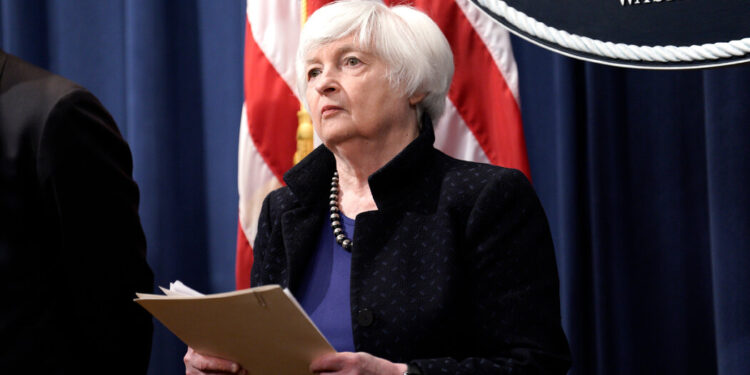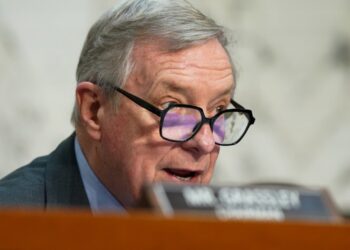Treasury Secretary Janet L. Yellen told Congress on Friday that on Jan. 21 the Treasury Department will have to begin using so-called “extraordinary measures” to prevent the United States from defaulting on its debt.
The warning was likely one of Ms. Yellen’s final acts as Treasury secretary before the Trump administration assumes power at noon on Monday.
The debt limit — which caps the amount of money that the United States is authorized to borrow to fund the government and meet its financial obligations — will now be the problem of the next Treasury secretary, along with President-elect Donald J. Trump and the lawmakers who must decide its fate.
Mr. Trump has tapped Scott Bessent, a billionaire hedge fund manager, to lead the Treasury Department. The job requires Senate confirmation.
In her letter, Ms. Yellen sought to remind lawmakers that the debt limit simply allows the government to pay for spending that Congress has already approved.
”The debt limit does not authorize new spending, but it creates a risk that the federal government might not be able to finance its existing legal obligations that Congresses and Presidents of both parties have made in the past,” Ms. Yellen said in the letter. “I respectfully urge Congress to act promptly to protect the full faith and credit of the United States.”
The debt limit was suspended in June 2023 after a contentious negotiation over federal spending, work requirements for receiving government benefits and funding for the Internal Revenue Service.
That suspension was scheduled to expire on Jan. 2, forcing the Treasury Department to begin using so-called extraordinary measures to allow the federal government to keep paying its bills. However, because of a technical issue related to federal investments, Ms. Yellen said in December that she expected extraordinary measures would have to be employed sometime between Jan. 14 and Jan. 23.
Those measures are essentially accounting maneuvers that can prevent the government from breaching the debt limit. They can include suspending certain types of investments in savings plans for government workers.
As part of those moves, Ms. Yellen said that she would be unable to fully invest in the Civil Service Retirement and Disability Fund and that a “debt issuance suspension period” will now run from Jan. 21 through March 14. The Treasury Department is also suspending certain investments in the Postal Service Retiree Health Benefits Fund.
The United States borrows money to pay its bills and obligations, including funding for social safety net programs, interest on the national debt and salaries for members of the armed forces. If the United States is unable to raise the debt limit, it will soon be unable to make many of those payments, including to investors who have bought government debt. Failure to make those payments to bondholders would result in the United States effectively defaulting on its debt.
As lawmakers negotiated last month over a government spending bill, Mr. Trump complicated matters by making a last-minute push for Republicans to lift or eliminate the debt limit. Republicans have for years used the debt limit as leverage to force Democrats to go along with painful spending cuts while they are in power, so the gambit by Mr. Trump put members of his own party in a difficult position.
Ms. Yellen in 2021 called the debt limit “destructive” and said it should be eliminated. Her immediate predecessor as Treasury secretary, Steven T. Mnuchin, expressed similar sentiments in 2017 when he described it as a “somewhat ridiculous concept” that did not limit spending.
At his confirmation hearing this week, Mr. Bessent initially expressed skepticism about abolishing the debt limit, saying that he would study the issue and survey market participants about the merits of such a plan.
Mr. Bessent then added that he would explore ways to end the debt limit if Mr. Trump continued to push for that and insisted that either way the United States would continue to pay its bills.
“The United States is not going to default if I’m confirmed,” Mr. Bessent said.
Ms. Yellen said that it was unclear how long the extraordinary measures would be able to be used to avoid a default.
The Bipartisan Policy Center projects that the true “X-date,” which is when the nation could actually default, would most likely occur sometime this summer.







